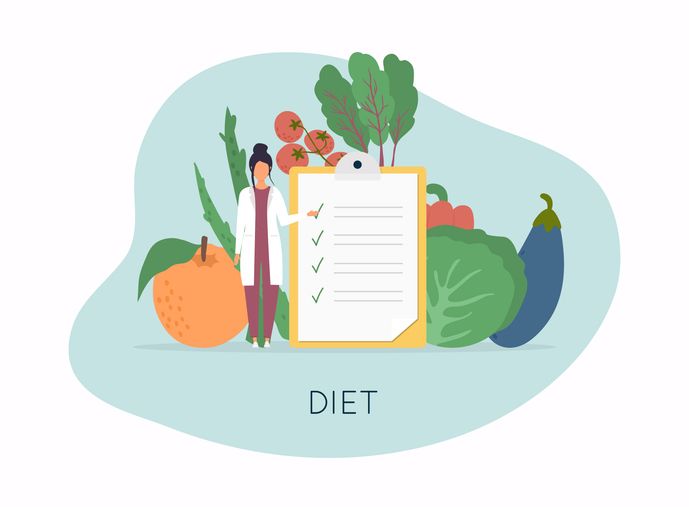
Author: Natalie Ng|Updated: 6 June 2025
Hormones quietly shape how your body works, including where fat shows up and how your digestion feels. If you’ve noticed stubborn belly fat or frequent bloating, your hormones could be part of the reason. Even with regular meals and movement, shifts in hormone levels can make it harder to feel balanced. A hormone balancing diet can help bring things back on track. The way you eat affects everything from blood sugar to cortisol levels, which in turn can influence weight gain, bloating, and how your body stores fat. Supporting hormone health through simple food choices and regular habits can make a real difference over time. Keep reading to learn how your daily meals connect with hormone balance and what small changes can help support your overall well-being.

Hormone Balancing Diet and Belly Fat: How They're Connected
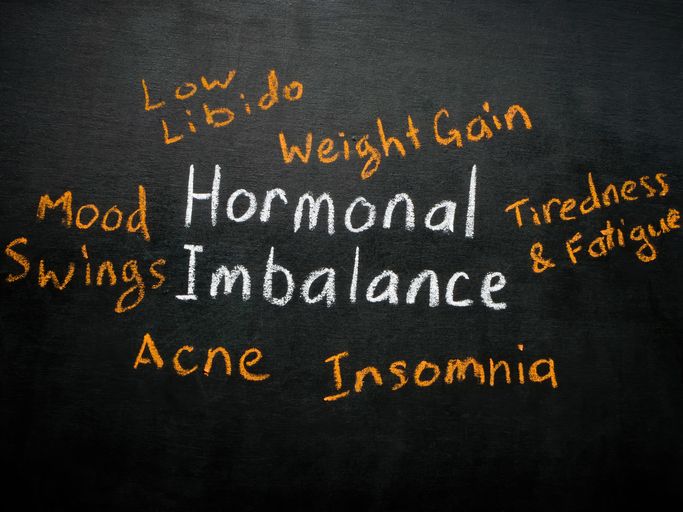
Hormonal imbalance can lead to stubborn belly fat
Hormones act as chemical messengers that guide many of your body’s functions, including how and where you store fat. When your hormone levels shift, your body can respond by holding onto fat—especially around your belly. This can happen even if your diet and physical activity haven’t changed.
Cortisol and insulin influence fat storage
Cortisol, known as the stress hormone, rises when your body feels under pressure. High cortisol levels encourage your body to store fat around the abdomen to protect vital organs. At the same time, insulin plays a big role in how your body uses glucose. If your insulin sensitivity drops, your body may hold on to more sugar, storing it as fat instead of using it for energy. This is especially common with insulin resistance, which can be linked to weight gain and increased fat tissue in the belly.
Estrogen affects fat distribution
Changes in estrogen levels during menstruation, perimenopause, or menopause can shift where fat is stored. When estrogen drops, the body tends to store more visceral fat—this is fat that wraps around your organs and can affect both reproductive health and overall health. Some foods may also mimic estrogen in the body, which can further impact estrogen metabolism and hormone balance.
Thyroid function affects how your body burns fat
Thyroid hormones help control how fast your body uses energy. If your thyroid slows down, your metabolism does too. This can lead to more fat being stored, especially in the midsection. Supporting thyroid function through a hormone balancing diet can help improve how your body processes food and burns calories.

Hormone Balancing Diet Tip 1: Include Nutrients That Support Hormone Balancing Diet for Women
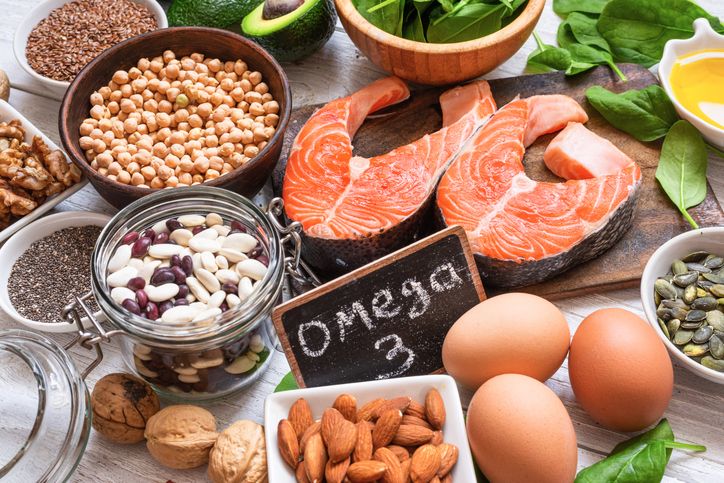
Key vitamins and minerals improve hormone balance
Your body needs certain nutrients to keep hormone levels steady and to support healthy hormone production. These nutrients play important roles in how your body manages estrogen, cortisol, and other reproductive hormones. A diet lacking in these nutrients can lead to hormone imbalances and affect everything from your metabolism to your mood.
Omega 3 fatty acids support hormone production
Omega 3 fatty acids help reduce inflammation and support the production of certain hormones. They also help improve insulin sensitivity, which may reduce belly fat linked to insulin resistance. You can get omega 3s from fatty fish like salmon, or plant sources like walnuts and chia seeds.
B vitamins help balance estrogen and cortisol
B vitamins, especially B6, play an important role in estrogen metabolism and cortisol regulation. They help your body clear out excess estrogen and support adrenal glands during times of stress. B vitamins are found in leafy greens, eggs, and whole grains.
Magnesium helps regulate cortisol and thyroid hormones
Magnesium supports thyroid function and helps your body manage cortisol levels. It also contributes to better sleep and muscle recovery, which are both important for hormone health. You’ll find magnesium in dark chocolate, almonds, and pumpkin seeds.
Zinc promotes progesterone and supports thyroid health
Zinc helps regulate reproductive hormones like progesterone and supports thyroid hormones involved in metabolism. Low zinc levels may affect how your body responds to stress or ovulation changes. Foods rich in zinc include oysters, beef, and pumpkin seeds.
Including these nutrients regularly in your meals can improve hormonal balance, support estrogen levels, and improve overall well-being. Each nutrient works alongside the others to help maintain stable hormone signals and support your endocrine system.
Book Now to Experience
S6 Body Sculpting Treatment
1 Minute Self-Registration
Date should not be before minimal date

Hormone Balancing Diet Tip 2: Include Foods That Help Reduce Hormonal Bloating

Certain foods ease bloating caused by hormone changes
Hormonal bloating often shows up during the menstrual cycle or times of hormonal imbalance. It can make you feel heavy, sluggish, and uncomfortable. Eating the right foods can ease these symptoms by supporting digestion, reducing water retention, and calming your gut.
Ginger soothes digestion and reduces inflammation
Ginger contains natural compounds that help relax the digestive tract and reduce inflammation. Drinking ginger tea or adding fresh ginger to meals can ease bloating and improve gut health.
Pineapple aids digestion and fluid balance
Pineapple is rich in bromelain, an enzyme that helps your body break down food more efficiently. It also helps reduce water retention, making it a helpful choice during hormone-related bloating.
Cucumber and celery act as natural diuretics
Both cucumber and celery have a high water content and provide essential minerals. They help your body release excess water and reduce puffiness without dehydrating you.
Greek yogurt supports gut health
Greek yogurt contains probiotics that support your gut microbiome. A healthy gut helps regulate hormone levels and can reduce bloating caused by digestive issues.
Bananas and sweet potatoes help balance fluids
These potassium-rich foods help your body manage sodium and fluid levels, which reduces bloating. They also support blood sugar control and hormone balance throughout the day.
Fennel seeds and peppermint relieve gas
Both fennel and peppermint help relax the muscles in your digestive system, easing gas and bloating. You can chew fennel seeds after meals or sip peppermint tea for relief.
Leafy greens and berries reduce inflammation
These anti-inflammatory foods are packed with antioxidants that help calm the body’s response to hormonal shifts. They also support liver function, which helps your body process excess hormones.
Green tea supports digestion and hormone function
Green tea helps reduce water retention and provides gentle caffeine to support energy. It also supports metabolism and contains antioxidants that benefit hormone health.

Hormone Balancing Diet Tip 3: Avoid Foods That Disrupt Hormone Balance in Women
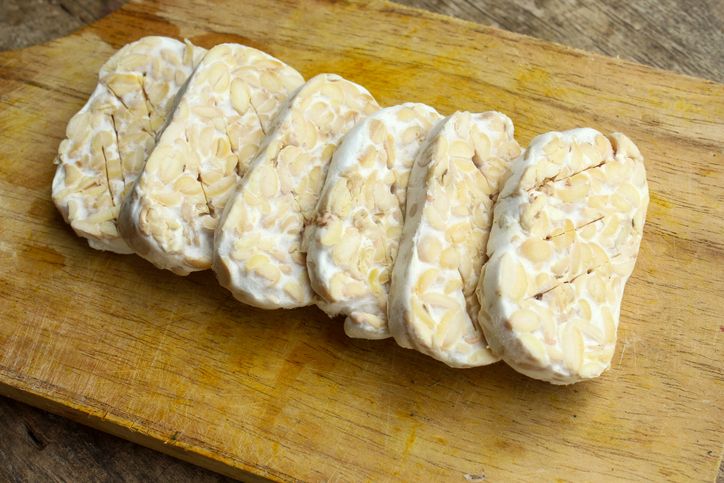
Some foods interfere with natural hormone production
Certain foods can affect how your endocrine system functions, making it harder for your body to balance hormones properly. Regularly eating these foods may lead to hormonal imbalances that affect your mood, metabolism, and reproductive health.
Processed soy products may mimic estrogen
Highly processed soy products like soy protein isolate and textured vegetable protein can mimic estrogen in the body. This may interfere with estrogen metabolism and affect estrogen levels, especially when consumed in large amounts. They can also impact thyroid function, which plays a key role in hormone regulation.
Conventional dairy and meat may contain added hormones
Dairy and meat from conventionally raised animals may contain synthetic hormones or antibiotics. These additives can affect your own hormone signals and disrupt natural hormone production, especially over time. Choosing organic or hormone-free options can help reduce this risk.
Artificial sweeteners and high fructose corn syrup affect insulin
Sweeteners like sucralose or aspartame, along with high fructose corn syrup, may affect insulin levels and increase cravings. These can lead to insulin resistance and unstable blood sugar levels, which contribute to belly fat and hormonal imbalance.
Refined vegetable oils can increase inflammation
Oils high in omega 6 fatty acids, such as soybean, corn, and sunflower oil, can promote inflammation in the body. This inflammation may interfere with hormone signaling and increase stress on the endocrine system. Swapping them for healthy fats like olive oil can support hormone health.
Reducing or avoiding these foods helps protect hormone signals, improve blood sugar regulation, and support long-term hormonal balance. Making these changes can also improve liver function and support estrogen detoxification.
Book Now to Experience
S6 Body Sculpting Treatment
1 Minute Self-Registration
Date should not be before minimal date

Hormone Balancing Diet Tip 4: Meal Timing for Better Hormonal Health
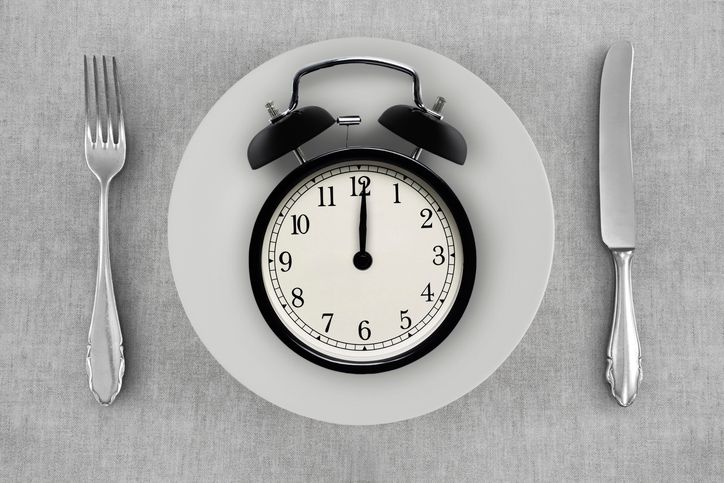
Regular meal timing supports stable hormone levels
How often and when you eat affects your hormone production, blood sugar levels, and metabolism. Meal timing can either support or disrupt your body's natural hormonal rhythm. Following a regular eating pattern helps reduce inflammation and supports hormone signals throughout the day.
Align meals with your natural rhythm
Your body follows a daily rhythm that influences digestion, hormone release, and energy levels. Eating in line with this rhythm can help balance hormones like insulin and cortisol.
Morning: Start with a balanced breakfast
Eating within two hours of waking supports insulin sensitivity and helps regulate blood sugar. A balanced breakfast with protein, healthy fats, and whole grains supports energy and hormone balance early in the day.
Midday: Eat your largest meal
Your metabolism and digestive system are most active around midday. Eating your most nutrient-rich meal at lunch supports optimal digestion and helps reduce fat tissue buildup around the midsection.
Evening: Keep dinner light
A lighter dinner at least three hours before bedtime allows your body to wind down and support growth hormone and melatonin production. Eating too close to bedtime can disrupt cortisol levels and interfere with quality sleep.
Limit frequent snacking
Frequent snacking keeps insulin levels high throughout the day, which may lead to insulin resistance over time. Instead, aim for two to three balanced meals and allow gaps between them to give your body time to regulate blood sugar and reduce inflammation.
Time-restricted eating helps hormone signals
Eating within an 8 to 10 hour window each day can support hormone balance by improving insulin sensitivity and reducing chronic stress on your digestive system. This gives your body time to reset overnight and maintain better hormonal health.

Hormone Balancing Diet Tip 5: Support Hormonal Balance With Exercise and Movement

Daily activity helps regulate hormone levels naturally
Regular movement supports the way your body produces and responds to hormones. Exercise helps manage cortisol, improve insulin sensitivity, and balance estrogen levels. It also helps reduce fat cells that store excess hormones and disrupt your endocrine system.
Cardio improves insulin sensitivity and reduces stress
Moderate cardio helps your body use insulin more effectively, which lowers the risk of insulin resistance and hormone imbalances. It also reduces cortisol levels, the stress hormone linked to belly fat and inflammation. Try brisk walking, cycling, or swimming for about 30 minutes most days of the week.
Strength training supports hormone production
Building muscle through strength training boosts your metabolism and supports hormone signals that regulate fat storage and energy use. Lifting weights two or three times a week helps lower insulin levels, supports testosterone balance, and improves overall hormone health.
Low-impact movement reduces cortisol and supports recovery
Gentle exercises like yoga, Pilates, or stretching can calm your nervous system and reduce cortisol spikes. These types of movement also support better sleep, which is essential for hormone production and recovery.
Move regularly throughout the day
Even light activity during the day makes a difference. Taking short walking breaks every hour supports circulation, regulates blood sugar, and helps prevent cortisol buildup from long periods of sitting.
A balanced approach to exercise—one that includes a mix of cardio, strength, and gentle movement—can help support hormone signals, manage weight gain, and improve your overall well-being.
Book Now to Experience
S6 Body Sculpting Treatment
1 Minute Self-Registration
Date should not be before minimal date

Hormone Balancing Diet Tip 6: Make Lifestyle Changes That Support Hormonal Health

Simple habits can improve your hormone balance over time
Beyond food and exercise, certain lifestyle habits influence your hormone levels every day. Sleep patterns, stress exposure, and daily routines all affect how your body produces and responds to hormones like cortisol, insulin, estrogen, and melatonin. Supporting these areas can help reduce hormone imbalances and improve your overall health.
Sleep supports hormone production and repair
Getting enough quality sleep helps your body regulate hormone levels and repair itself overnight. During deep sleep, your brain signals the release of growth hormone, which supports tissue repair, metabolism, and overall endocrine health. Aim for 7 to 9 hours of uninterrupted sleep each night. A regular bedtime routine and reduced screen time in the evening can support better sleep quality.
Chronic stress can disrupt hormone signals
Ongoing stress raises cortisol levels, which can interfere with insulin function, slow down digestion, and increase belly fat. Over time, chronic stress can also affect reproductive hormones and lead to irregular cycles or worsened PMS symptoms. Finding simple ways to reduce stress, such as spending time outdoors, practicing light stretching, or doing hobbies you enjoy, can help balance hormones naturally.
Daily routines influence cortisol and melatonin
Your body responds to light, meals, and movement as cues for hormone production. A regular schedule that includes waking at the same time each day, morning sunlight, and meals at similar times helps regulate cortisol and melatonin cycles. This rhythm helps your body stay balanced and improves energy levels throughout the day.
Making small but steady adjustments in your lifestyle can have a meaningful impact on your hormone health, helping your body manage stress, sleep better, and support optimal hormone balance in the long run.

Hormone Balancing Diet Tip 7: Create a Personalized Meal Plan for Better Hormone Health

Tailor your meals to match your body’s needs
Every woman’s body responds differently to food, stress, and hormone shifts. Creating a meal plan that supports your unique hormone levels can help reduce symptoms like bloating, fatigue, or weight gain. A personalized hormone balancing diet allows you to focus on what works best for your body.
Track symptoms and patterns
Start by keeping a food and symptom journal for at least two weeks. Write down what you eat, how you feel after meals, your energy levels, sleep quality, and any hormone-related symptoms like mood swings or bloating. This helps identify patterns and potential food triggers.
Focus on food groups that support hormone balance
Once you spot patterns, start building your meals around whole foods that support hormone production. Include:
• Leafy greens and cruciferous vegetables for estrogen metabolism
• Lean protein and essential amino acids to support hormone signals
• Healthy fats like olive oil, avocado, and nuts to regulate reproductive hormones
• Whole grains like brown rice and oats to stabilize blood sugar levels
• Probiotic foods like Greek yogurt or fermented vegetables to support gut health
Eat at regular times
Plan your meals at regular intervals to support stable blood sugar and reduce cortisol spikes. A predictable eating schedule helps regulate hormone production and supports digestive and adrenal health.
Adjust based on how your body responds
Use what you learn from your journal to make small changes over time. If something causes bloating or fatigue, try reducing or swapping that food. If certain meals make you feel more energized or balanced, include them more often. You can also work with a healthcare professional to refine your plan, especially if you’re managing hormone-related conditions like PCOS or thyroid issues.
Book Now to Experience
S6 Body Sculpting Treatment
1 Minute Self-Registration
Date should not be before minimal date

Hormone Balancing Diet Tip 8: Maintain Long-Term Hormonal Health With Small Daily Choices

Daily habits build lasting hormone balance
Hormone balance doesn’t come from one perfect meal or a single workout. It comes from the small choices you make every day. What you eat, how you sleep, when you move, and how you manage your schedule all influence your hormone levels and how your body responds over time.
Prioritize whole foods over processed options
Choosing whole foods instead of refined carbohydrates, artificial sweeteners, and processed meats helps reduce inflammation and supports liver function. The liver plays a central role in breaking down excess hormones and keeping estrogen levels balanced. Focus on food groups rich in fiber, essential amino acids, and anti-inflammatory properties to help regulate hormone levels daily.
Stay hydrated to support the digestive system
Proper hydration helps your body eliminate excess hormones and supports your digestive system. Aim to drink water throughout the day and include water-rich foods like cucumber, celery, and berries. Hydration also supports regular bowel movements, which are essential for removing waste and excess estrogen.
Include probiotic and fiber-rich foods
A healthy gut helps regulate hormone production by supporting the gut microbiome. Probiotic foods like Greek yogurt, kefir, and fermented vegetables work well alongside fiber-rich choices like leafy greens, whole grains, and sweet potatoes. Together, they improve digestion, reduce inflammation, and support hormone signaling.
Maintain steady energy with balanced meals
Eating balanced meals that combine lean protein, healthy fats, and slow-digesting carbohydrates helps keep your blood sugar levels stable. This supports insulin sensitivity and reduces the risk of hormone imbalances linked to fatigue and weight gain.

Hormone Balancing Diet Tip 9: Watch for Signs of Hormonal Imbalance in Daily Life
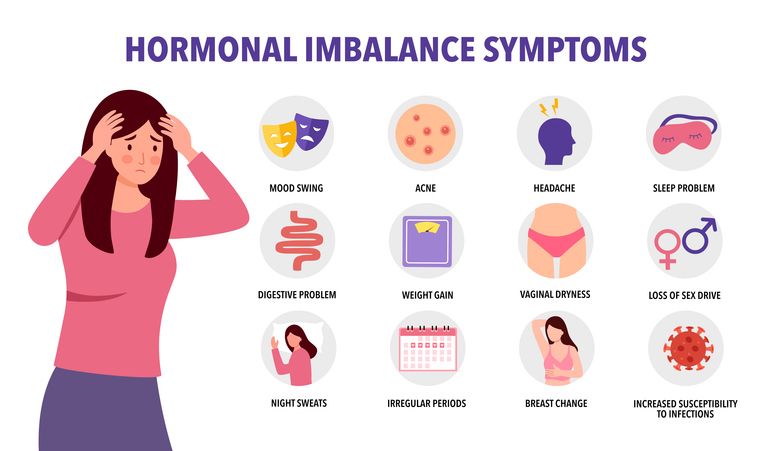
Subtle changes may point to shifts in hormone levels
Hormone imbalances can show up in small ways before turning into bigger health concerns. Paying attention to early signs can help you make diet and lifestyle changes before symptoms worsen. Tracking these changes also gives you helpful insights if you decide to speak with a healthcare professional.
Changes in weight or belly fat
Unexplained weight gain, especially around the belly, can signal issues with insulin levels, cortisol production, or low estrogen. If you’ve made no major changes to your eating or exercise habits but your fat tissue increases, it may be linked to hormone shifts.
Mood swings and sleep disruptions
Mood changes, irritability, and trouble falling or staying asleep may point to changes in cortisol, progesterone, or melatonin levels. These hormones affect your emotional state, sleep quality, and how your body handles stress.
Digestive issues and bloating
Regular bloating, slow digestion, or changes in bowel habits can reflect hormonal imbalances that impact your digestive system. This may include issues with estrogen metabolism or cortisol’s effect on gut health and inflammation.
Irregular menstrual cycles or worsened PMS symptoms
Hormone-related issues often affect the timing and symptoms of your cycle. Shorter or longer cycles, more intense PMS symptoms, or heavier periods may signal that your estrogen and progesterone levels are out of balance.
Fatigue and brain fog
Low thyroid function or poor adrenal health can lead to fatigue, poor focus, or slow thinking. These signs may reflect imbalances in your hormone signals and how well your body responds to stress and energy demands.

Pair Your Diet With S6 Body Sculpting Treatment for Visible Results
Support your hormone-focused routine with targeted fat reduction
Even when you're eating for hormonal balance and improving your overall health, some areas of body fat can still be stubborn. This is especially common in women, as hormone fluctuations—like shifts in estrogen levels or cortisol production—can lead to fat storage in specific areas such as the belly, thighs, or lower back. If these areas aren't responding to lifestyle changes alone, a non-invasive treatment like S6 Body Sculpting can help enhance your progress.
What is S6 Body Sculpting Treatment?
S6 Body Sculpting Treatment is a non-surgical, non-invasive body contouring therapy designed to target stubborn fat areas that often resist diet and exercise. The treatment uses a patented low-energy bio-laser to break down subcutaneous fat cells in specific parts of the body. This laser energy helps release fatty acids, which are then eliminated through the body's lymphatic system. To boost circulation and metabolism, the treatment also includes vacuum suction massage, which stimulates lymphatic drainage and supports faster fat removal.
How it complements a hormone balancing diet
Hormonal imbalances can make it difficult for your body to break down fat, especially if you’re dealing with high cortisol levels, insulin resistance, or shifting estrogen levels. While a hormone balancing diet for women helps regulate internal hormone signals, S6 Body Sculpting works on the surface to improve how your body responds to stored fat. By improving circulation, supporting lymphatic flow, and encouraging fatty acid metabolism, this treatment can amplify the visible results of your hormonal health efforts.
Key advantages of S6 Body Sculpting Treatment
• Targets stubborn fat in areas like the belly, waist, thighs, arms, and back, which are commonly influenced by hormonal changes
• Non-invasive: No surgery, injections, or medications involved
• No downtime: You can return to your routine right after each session
• Stimulates collagen to tighten and firm skin, which helps avoid sagging after fat reduction
• Supports metabolic rate, which can be helpful if hormonal shifts have slowed fat burning
By pairing a hormone balancing diet with treatments like S6 Body Sculpting, you're giving your body the internal and external support it needs to reduce fat more effectively and maintain better hormonal balance.
Book S6 today to support your fat loss and hormone health goals—without surgery or long recovery time.
New Beauty's S6 Body Sculpting TreatmentBook Now to Experience
S6 Body Sculpting Treatment
1 Minute Self-Registration
Date should not be before minimal date
FAQ
1. Can a hormone balancing diet for women help with mood swings and PMS symptoms?
Yes, certain foods can support hormonal balance and reduce mood swings, cramps, and irritability tied to PMS. Nutrients like vitamin B6, magnesium, and omega 3 fatty acids help regulate reproductive hormones and serotonin levels, which influence mood. A diet rich in leafy greens, whole grains, healthy fats, and lean protein can make a noticeable difference in emotional symptoms throughout the menstrual cycle.
2. What are some hormone balancing foods I can eat for breakfast?
A hormone-friendly breakfast should include foods that stabilize blood sugar levels and support hormone production. Good options include eggs (for essential amino acids and B vitamins), oats (for fiber and slow-release carbs), chia seeds (for omega 3 fatty acids), and Greek yogurt (for gut health and protein). Avoiding refined carbohydrates and sugar at breakfast can also help regulate insulin levels and support overall hormone health.
3. How does a hormone balancing diet support thyroid function?
Your thyroid plays a major role in hormone production and metabolism. A hormone balancing diet can support thyroid health by including foods rich in iodine, selenium, and zinc—such as seaweed, Brazil nuts, and pumpkin seeds. Avoiding excessive soy and refined vegetable oils may also support better thyroid function by reducing inflammation and protecting hormone signals.
4. Can I follow a hormone balancing diet if I’m trying to lose weight during perimenopause?
Yes, a hormone balancing diet is especially helpful during perimenopause, when estrogen and progesterone levels begin to fluctuate. This stage often comes with symptoms like weight gain, bloating, and mood changes. Focusing on whole foods, reducing refined carbohydrates, and including anti-inflammatory ingredients can help manage hormone imbalances and support weight loss goals during this transitional phase.
5. Is it possible to balance hormones without supplements?
While some people benefit from supplements, it is possible to support hormone balance through diet alone. Whole foods provide the nutrients needed for hormone production and regulation. Key components include healthy fats for hormone synthesis, protein for muscle support and blood sugar control, and fiber to aid estrogen metabolism. Staying hydrated, managing stress, and following regular meal times also play a role in maintaining natural hormone balance.
Recommended Articles
COPYRIGHT© NEW BEAUTY MANAGEMENT LIMITED 2026. ALL RIGHT RESERVED.


